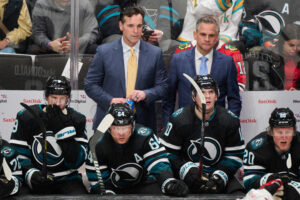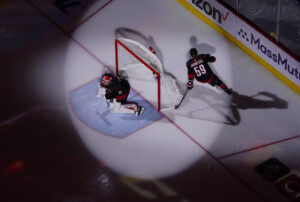The Starting Six series comes to you to dive into the best player at each position all-time for every organization. The biggest and best at each position, with the most memorable moments in franchise history. Here is the New York Islanders all-time lineup.
Starting Six: New York Islanders All-Time Lineup
The last three decades have been relatively unkind to the New York Islanders. Starting with handing the keys to the franchise to Mike Milbury – who blindly traded future stars Roberto Luongo, Olli Jokinen, and Zdeno Chara in deals that yielded lateral progress. Most recently, the Isles left their long-term venue in Long Island to play in Brooklyn – where they are now seemingly unwelcome.
However, the Islanders had one of the more dominant periods the league has ever seen before the extended run of current misfortune. Under legendary bench boss Al Arbour, New York won four consecutive Stanley Cups from 1980 to 1983. When determining the New York Islanders All-Time lineup, it’s derived from the teams dynasty years.
Centre: Bryan Trottier (1975-90)
Bryan Trottier is one of the first names that comes to mind when the Islanders franchise is mentioned in any context. Trottier scored an even 500 goals with New York, and was an integral piece of its postseason success. Trottier tallied 29 points in the first three Cup runs for the Isles, leading all skaters in two of those years.
The Val Marie, Saskatchewan native had his most impactful postseason in 1980, the first of the Isles championships. Trottier scored a league-high 12 goals and shut down the likes of Bobby Clarke in the Cup Finals, thus earning himself the Conn Smythe Trophy. Trottier also became the first player of Métis descent to win the Stanley Cup that year.
The franchise’s all-time leading scorer was not only valuable for his efforts as a point producer, but also a renowned defensive player. Trottier received Selke Trophy recognition in six separate seasons, finishing as the runner-up to Doug Jarvis in 1984.
For those four seasons, the Islanders were NHL royalty – and Bryan Trottier established himself as one of the greatest forwards in the history of the game.
Left Wing: Clark Gillies (1975-86)
Many believe that Gillies solely benefited from riding shotgun with Trottier and Mike Bossy for most of his career, putting his legend status in doubt. While his production may be slightly inflated, it’s hard to overlook the contributions Gillies provided with the Islanders.
Seen as the glue that held the legendary forefront line of the dynasty together, “Jethro” was a battering ram who could do a little bit of everything. Praised for many intangibles such as his leadership qualities and work ethic, Gillies is a guy who could excel in any era of the NHL.
Gillies strung together two seasons in which he was selected for the NHL’s First All-Star Team in 1978 and 1979, the apex of his career offensively. A large man for his era at 6’3″ and weighing in at 215 pounds, Gillies was a nightmare for opposing skaters to meet in the corners.
Six 30-goal seasons and a physical force for the entirety of his service time, Clark Gillies deserves a spot on the New York Islanders All-Time Lineup.
Right Wing: Mike Bossy (1977-87)
It’s impossible not to wonder what Mike Bossy could have been capable of had he lasted longer than 10 seasons in the league. Widely perceived as one of the greatest goal scorers of all-time, Bossy formed the Trio Grande – along with the aforementioned Trottier and Gillies – creating one of the best forward lines the NHL has ever seen.
Despite only having played 752 career regular season games, Bossy scored 573 goals giving him the best goals-per-game average in league history, at 0.76. He was an electrifying goal scorer, blessed with a magical set of hands and a precise shot.
Perhaps the most impressive feat for the Montréal native, is that he scored 50-or-more goals in every season of his career besides his last year in the league. Bossy was a five-time NHL First Team All-Star and led the league in goals twice – 1979 and 1981.
Many overlook or undervalue Bossy’s contributions due to his short career, but in his prime there wasn’t a player more adept at finding the back of the net. In the 72 games it took the Isles to win four Cups, Bossy tallied 111 points – leading the playoffs in goals three times.
Bossy had a short, albeit truly remarkable career spent entirely with the Islanders.
Defenseman: Denis Potvin (1973-88)
Most dynasties include superstar players at all positions, Denis Potvin was a true #1 defenseman whose legacy earns him a spot among the all-time discussion for the best blueliners of all-time.
One of the more complete defenders of all-time, Potvin was a brute force that delivered punishing body checks to any opposing forwards that dared to cross the right side of the blue line. The foundation of the Islanders championship years, Potvin also possessed an envious hockey IQ which allowed him to control the flow of the game as a defenseman.
Potvin collected three Norris Trophies during his career, the ultimate testament to his dominance at the position. He was as valuable offensively as he was at other components of the game – once eclipsing the 100-point plateau – which has only been done by four other defenders.
Potvin was the captain of New York for eight seasons, including the four championship years. You would be hard pressed to argue that there is a greater Islander than Denis Potvin.
Defenseman: Ken Morrow (1979-89)
Relative to Potvin, it is difficult to crown the second best defenseman in team history given their inferior résumés. Ken Morrow was around for the entire ride that was the most successful half-decade in USA hockey history.
Prior to winning a quartet of championships with the Islanders, Morrow was a member of the 1980 U.S. Olympic team that famously took gold in Lake Placid. Having seen what they had in Morrow during the Olympics, general manager Bill Torrey wasted no time in getting the imposing defenseman to join the Islanders after the tournament.
Morrow was a positionally sound defender who thrived alongside Potvin. A defenseman that never posted overwhelming stats as his game was more suited for shutting down the opposition. An uncanny trend Morrow followed in his career was having a knack for scoring clutch goals.
Three of his 11 postseason goals came as overtime winners, including one in 1984 that eliminated the cross-state rival Rangers from the playoffs.
Goaltender: Billy Smith (1972-89)
Billy Smith‘s career numbers suggest he was a guy who thrived by playing behind a legendary group of skaters. While this assumption is correct, Smith saved his best play for the postseason – becoming perhaps the most vital piece to the Islanders dynasty.
In the postseason, Smith’s 2.73 goals-against-average is considerably lower than his regular season mark of 3.17. The native of Perth, Ontario also recorded 15 wins two separate times in his postseason career.
Smith was one of the more combative goaltenders in NHL history, having a reputation as a netminder who actively used his stick to clear opposing skaters out of his crease. Smith would also fight skaters if his antics called for it, he currently ranks second all-time in goaltender penalty minutes.
Smith holds the all-time records in games played and wins for the Islanders, strapping on the pads for an impressive 675 games. He was also the first goaltender to be credited with scoring a goal, despite not actually shooting the puck into the net.
When considering the New York Islanders all-time lineup, the teams golden years produced the best collection of greats. These six players undoubtedly were the reason for the Islanders success in the 1980’s.
Currently? There isn’t too much to be crazy about, there are musings that superstar John Tavares could sign a deal that will keep him in the royal blue and orange up until the twilight of his career. It’s up to Tavares and his supporting cast to make New York great again.
Main Photo:






